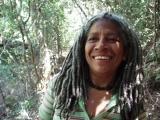Posted on June 21, 2010

Researching the history of slavery revealed a side of me such that I would sometimes mirror the sentiments and emotions of the stories I uncovered. I read and relived many times, the results being painful. Challenging personal issues for me became clearer as I read the stories of my forefathers and foremothers.
Little did I know then that I would be embarking on a journey so profound that it would take me to Robben Island in search of Madagascan slave, Masavana's grave who in 1766 led a successful rebellion on a Dutch slave ship called the 'Meermin' (Mermaid) near our southern coast. Masavana was never charged, was abandoned and died on the island. I did not find his grave. Many there are unmarked, unknown to the Cape's and South African history.
The challenges in our communities are a regular topic of newspaper and television reports and continue to provide absorbing conversation around issues such as racism, unemployment, drug abuse, crime, illiteracy, and job creation. The absence of knowing who I am and where I come from is enacted in my every day life; on the trains, taxis, cinemas, I frequently feel a tenseness, an intolerable feeling and questioning of, 'who are you? who do you think you are?' These current issues should be aligned and their thread with our historic past and heritage (e.g. racism, domestic violence, alcohol foetal syndrome and its relation to the dop system on farms, farm evictions) should be more widely known. Museums would be the prime institutions to help create such awareness. Active public discussion and participation around these issues should be driven by community representatives, government, and non-government, private and concerned citizens of Cape Town.
The effects and affects of Apartheid on the people of South Africa should be reflected across all racial borders. That the so-called oppressor (white Afrikaner) and everyone who benefitted from it (i.e. other Caucasian people), were forced to support a system which they did not necessarily agree with or believe in. Even the stories of those who believed in the institution of apartheid should also be told to get a better understanding of our collective past. This point of view will contribute to healing and thus reconciliation.
Cultural tourism plays a fundamental role in fostering social cohesion, nation building and reconciliation. Through cultural tourism we will see how the other parts of our nation live. This cultural tourism should not merely reflect one part of our nation's people. It should include the sum of our entire communities, i.e. 'African', Mixed-race (coloured), Caucasian, Indian, Hindi, etc. I founded Transcending History Tours with the aim of beginning the work just described. Through ethical tourism we will understand our diversity without ignoring the obvious tensions between races in Cape Town and our country and where these tensions come from so that 'black' communities (the mixed race group or coloured), which have some of their roots in Khoi and San as well as those enslaved communities brought to the Cape, are given recognition and status.
South Africa and its people's socio-economic situation is a direct effect of our past. We can only start to understand these issues in their totality once we know the root of the problems. These challenges are my inspiration and drive me to continue to recollect. I am an African.
Transcending History Tours
Transcending History Tours (THT) is an innovative closed corporation which offers a refreshingly new Cultural Heritage tourism experience. It is a member of Cape Tourism, vigorously promoting Cape Town as a prime tourist destination, unique in its historical diversity and culture. Its core function is conducting and hosting walking tours to cultural slave heritage sites within and outside the City of Cape Town. These tours include the enactment of the life of slaves at the Cape during the 16th, 17th and 18th centuries with reference to present day Living Heritage sites. My personal interpretive tours offer insight into slavery at the Cape, and engage with topical issues in museums and other sites of memory. They also offer engagement with Human Rights issues.
THT researches history through mapping and recollecting the heritage of slavery at the Cape. THT then transforms the information available in books from the National Archives, Reference Library, Iziko Museums Social History Resources Centre on Church Square, Community Researches into tours, talks, exhibitions and events.
THT engages with youth leaders, community representatives and Iziko Museums' Education and Public programmes through actively facilitating Cultural Heritage and Identity Workshops. It also collaborates with artists to reinterpret the history of Cape Town to local and international tourists. We also re-narrate the transformed history of slavery at the Cape to filmmakers, and national and international production companies to experiment with ways of reaching a wider and varied audience.
THT focuses on:
- Personalised stories of Cape Town's slave heritage.
- Hosting local community artists in Museums and visa versa and aspires to strengthen these ties.
- Customer Service Orientation training to Museums and community development activists to establish their own Museums.
- THT partners Iziko Museums Education and Public programmes to assist the institution in raising awareness of Slavery at the Cape, making museums more relevant.
- Maintaining links with the Tourism Industry to bring about a socio -economic shift from the City to the townships and other neglected areas.
- THT conducts ongoing research on the history of Slavery at the Cape and uses this in telling the story to both local and foreign visitors.
Lucy Campbell has more than ten years experience in museums and heritage sites. She holds a postgraduate degree in Museum & Heritage Studies from the University of Cape Town. She is also a registered tour guide and holds a certificate in Cultural Site Guiding from the Cape Peninsula University of Technology's Graduate Centre for Management. Her tours echo her own journey of self-discovery.